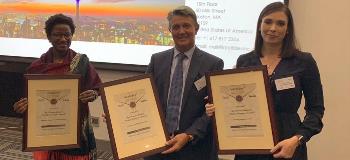SA needs an ideological shift in its approach to the economy
South Africa needs to provide an enabling environment with policy and regulatory certainty if it is to attract foreign and local investment.
.jpg?sfvrsn=9002b592_0&size=1140)
Increased levels of debt, growing unemployment, a greater dependency on social grants, a narrow tax base and persistent inequality with one of the highest Gini coefficients in the world are just some of the economic challenges facing South Africa.
The primary surplus that National Treasury is reporting is primarily driven by commodity price related tax receipts. While a welcome ‘windfall’ it’s not indicative that South Africa’s historical deficit is a thing of the past. In fact, the country’s debt quantum and the trajectory thereof has not changed.
Neither has the unemployment trajectory changed: using the expanded definition, around 45% of the population is unemployed while those reliant on social grants has grown from just 7% in 1996 to an estimated 35%.
Government’s attempts to implement fiscal discipline to avoid the debt load from overwhelming the fiscus has had only limited success given its capitulation on issues such as the public service wage bill and social welfare dependency – both issues where a firm approach had been promised. There is a growing concern that the recent tax ‘windfall’” from the mining sector has already been spent on the public sector wage bill (R18 billion) and social grants (R30 billion).
Economic growth is expected to moderate back to sub potential levels between 1.5% and 2% which makes South Africa vulnerable to a cooling off of the commodity cycle. If commodity prices are no longer able to support higher levels of revenue collection, then these expenditure items – which in all likelihood will be recurrent - will exacerbate the budget deficit and result in additional debt.
In short, the risk is that the windfall has been used on consumption expenditure - which becomes embedded going forward - and hasn’t been applied to reducing the debt load. In addition, expenditure is diverted away from economic growth generative initiatives towards shorter term spending. Proposals such as the universal basic income grant and National Health Insurance (NHI) will be difficult to implement without perpetuating the deficit.
Ultimately, however, the root cause of South Africa’s challenges is a lack of economic growth. For the better part of the last decade and a half, the country has had a significantly lower rate of economic growth than its developing market peers. What growth it has had has not been sufficient to accommodate population growth or the country’s spending patterns.
Despite the fact that some commentators are pointing to improved debt metrics the question that needs to be asked is ‘what has really changed?’ The trajectory remains the same without a meaningful change in our growth path.
To change the trend of ‘sub-potential’ growth rates, we urgently need to attract foreign and local investment. The reality, however, is that the allocation of capital - both global and local - is a competitive process. Allocators of capital evaluate multiple opportunities and tend to gravitate towards opportunity sets where more certainty exists.
The sting the tail here is that ‘good payers’ are removed from the system and Eskom is left having fewer buyers who are of lower quality…
To attract investment capital, we need to be providing an enabling environment with policy and regulatory certainty. Despite some positive progress, particularly in allowing for private sector participation in power generation – although the sting in the tail here for Eskom is that it removes ‘good payers’ from the system and leaves the power utility with fewer buyers who are of lower quality - the majority of the reforms required are happening too slowly to appease jittery investors. In addition, there is mixed messaging from government with regards to engaging the private sector as a source of funding and expertise, while continuing to push the narrative of a state led recovery, the developmental state and ambiguity around property rights.
The biggest impediments to attracting investment is government’s apparent inability to move away from ideological policies that have either failed to yield positive results to the economy - such as cadre deployment - or that creates uncertainty, undermines confidence and scares away investment.
The state of the economy on a range of metrics including consistently sub potential growth, unemployment, debt and fiscal health points towards a need for an ideological shift in the approach to the economy.
The recent release of the Fraser Institute’s - an admittedly free market think tank - annual economic freedom report included a whole chapter on the dangers of South Africa’s proposed expropriation without compensation policy. This too will have fuelled investor concerns. This year South Africa ranked 84 out of 152 countries in terms of economic freedoms.
The report’s author, the Free Market Foundation’s Martin van Staden, describes expropriation without compensation as ‘confiscation’. He writes that, “There is no assurance to domestic or foreign property owners and investors that their assets are safe from an expropriating authority simply deciding to confiscate their property arbitrarily.”
Research indicates that countries with weak property rights exhibit slower economic growth than countries with strong property rights. In South Africa land ownership is inextricably intertwined with the economy. Given that property bonds account for around a third of the banking sector’s assets, a threat to expropriate assets without compensation could potentially trigger a banking crisis.
Policy uncertainty is another significant challenge. There was some good news recently after the High Court ruled in favour of the Mineral Council South Africa that a mining company that has once been empowered is always empowered. The Mineral Council’s argument is that a mining company’s empowerment credentials should stand in perpetuity once it has met the threshold stipulated in the Mining Charter for black ownership - even if the empowerment partner subsequently sells its stake.
The Department of Mineral Resources and Energy (DMRE) has a different view, arguing that the charter’s ownership target remains. In essence, this would mean that a mining company would have to keep increasing its BEE ownership stake, diluting shareholding and stifling investment. Clearly, there is a point where this is no longer viable.
Rather than tying the matter up in endless legal hoops, the DMRE needs to focus its attention on fast-tracking the more than 5 000 applications that are held up in the department. The mining industry estimates that around R20 billion worth of projects are on hold, resulting in an almost complete standstill in exploration and new mining development. At a time when South Africa desperately needs to be attracting new investment the DMRE should be investigating ways to make it easier for companies to invest rather than tying applications up in years of bureaucracy.
The issue of execution is another challenge that plagues South Africa’s prospects. Government’s failure to allocate spectrum is an example of this. The Independent Communications Authority (Icasa) granted additional emergency spectrum during the pandemic in order to meet the increased demand created by lockdowns and remote working. However, it recently announced it would be terminating these licenses at the end of November. As Busi Mavuso, CEO of Business Leadership wrote recently, it is difficult to understand the rationale for Icasa’s decision given that the need for increased data persists and the economic implications for removing this emergency spectrum.
The Employment Equity Amendment Bill – described by the official opposition as a “job-destroying jackhammer” – will also be doing little to encourage investment or address South Africa’s burgeoning unemployment problem.
While there will always be differences in ideological approaches to the management of an economy and to the policies that are used, if one simply looks at the results of the last number of years, it is difficult to argue that the status quo is working. It’s time to put the best interests of the country first.






.jpg?sfvrsn=3ccd9277_0&size=350)

.png?sfvrsn=38ac0893_0&size=350)

































